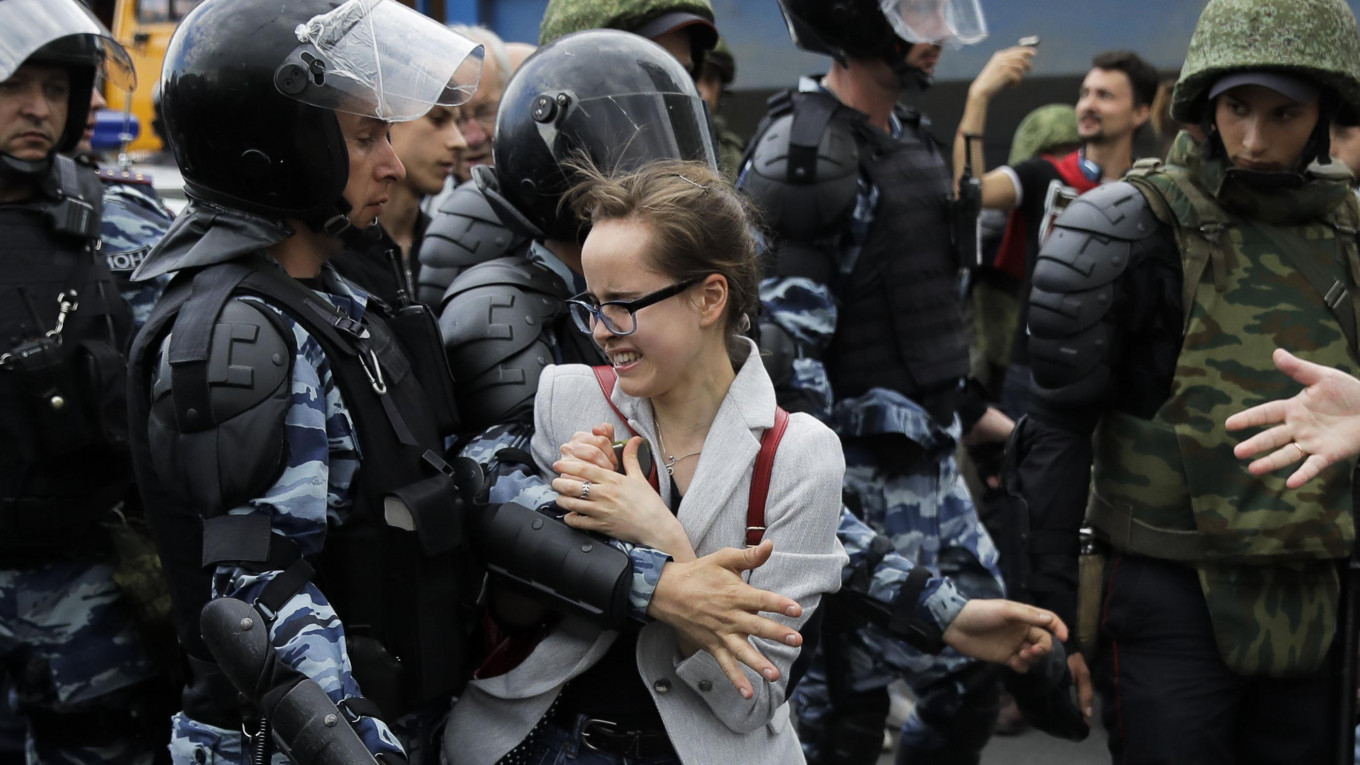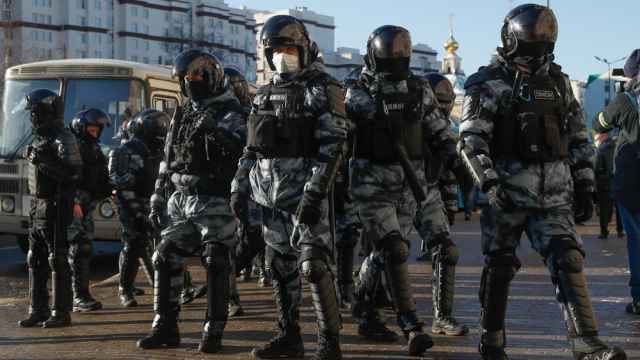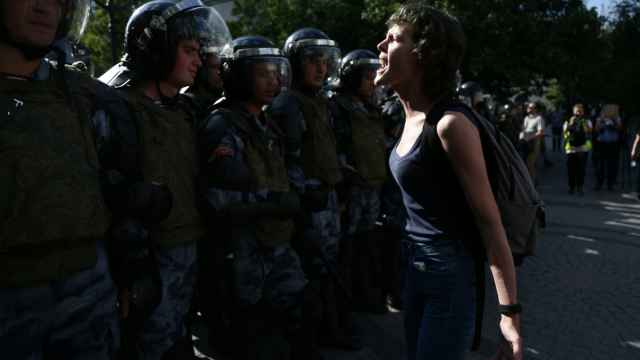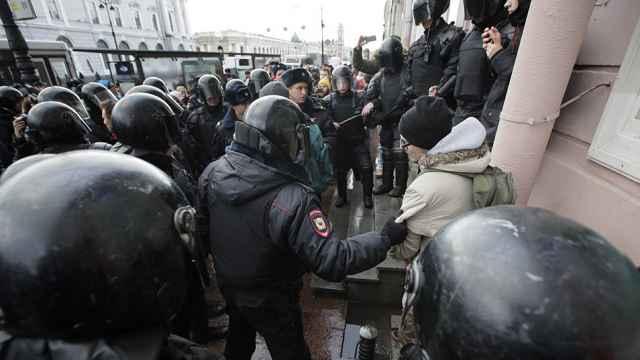When anti-corruption protests took place in cities across Russia earlier this month, police in St. Petersburg detained over 600 demonstrators.
The experience of these people in jail is highlighting the seemingly widespread abuse of prisoners by the Russian police.
Protester Oleg Kabatov says he had never been arrested before, so he was unprepared for what awaited him. For two days after his detention in St. Petersburg, Kabatov was held in police custody where he witnessed an incident that has provoked widespread outrage.
According to Kabatov and several other eyewitnesses, police officers used pepper spray in the close confines of precinct cells, causing detainees to experience severe breathing difficulties.
“They brought in a very drunk person who was quite aggressive,” says Kabatov. “One of the policemen hit him...then they sprayed the gas and closed the [cell] door...the gas got to us via the ventilation system.”
Kabatov was in a cell with 11 other people, many of whom were so badly affected that their skin turned red, they sweated profusely and coughed constantly. “I had to breathe through my clothes,” says Kabatov.
The ordeal only ended when one detainee, who had smuggled in a mobile phone, summoned an ambulance.
“The paramedic was surprised by what was going on and said ‘you need to get ten ambulances here. What have you done? It’s impossible to breathe,’” according to a woman in a neighboring cell quoted by OVD-Info, an NGO that tracks political arrests. “They checked my pulse and then left,” said the woman, who declined to have her name published by OVD-Info for fear of retribution
The incident is one of many allegations of police abuse in St. Petersburg since the June 12 demonstrations organized by opposition leader and presidential hopeful Alexei Navalny.
“People saw [for the first time] that the state is a repressive mechanism,” says Polina Kostyleva, the head of Navalny’s headquarters in St. Petersburg.
But police have denied they did anything illegal in the incident with the pepper spray. “In accordance with the law, a police officer used special measures,” a St. Petersburg police spokesman told the RIA Novosti news agency.
The legality of what occurred depends on the chain of events, says Boris Panteleev, the St. Petersburg coordinator of gulag.ru, which monitors prison abuses. Under certain circumstances, officers can resort to pepper spray.
“It is not commonly used but it happens,” Panteleev says.
Russia has long been criticized for a culture of police brutality, including allegations of torture much worse than what the St. Petersburg protesters apparently faced. Victims and activists have reported cases where police have beaten detainees, administered electric shocks to their genitalia and hung them by handcuffs. Long disappearances within the prison system, when families cannot locate their loved ones, also occur.
“Torture and other ill-treatment continued to be widespread and systematic during initial detention and in prison colonies,” international human rights charity Amnesty International concluded in a report on abuses in Russia published earlier this year.
OVD-Info estimates that 2,000 people — including over 800 in Moscow — were detained across Russia after the June 12 anti-corruption rallies. The 640 detentions in St. Petersburg have led local courts to hand down a total of 923 days of arrest and 4.3 million rubles ($74,000) in fines, according to Kostyleva.
Other incidents recorded in St. Petersburg include alleged assault. “Two detainees were taken to a separate room behind an iron door and beaten up,” activist Denis Styazhkin wrote on Twitter on June 12.
Kostyleva tells the story of a female protester who had to spend time in a cell infested with bedbugs. Local journalist Arseny Vesnin says he spoke to one man who was hospitalized with pneumonia after two days in custody. He was housed in a cell where there was one blanket for six people and the temperature never rose above 10 degrees Celsius.
Monitoring groups maintain that there is nothing unusual in many of these stories.
Instances of detainees sleeping in corridors, receiving little food and being held without charges for more than three hours or barred access to a lawyer are “very common” across Russia, says gulag.ru’s Panteleev.
After his experiences in jail, Navalny supporter Kabatov says he will not attend another protest if there is a risk of being arrested.
“A second conviction could mean a real sentence in a real prison colony,” he says.
A Message from The Moscow Times:
Dear readers,
We are facing unprecedented challenges. Russia's Prosecutor General's Office has designated The Moscow Times as an "undesirable" organization, criminalizing our work and putting our staff at risk of prosecution. This follows our earlier unjust labeling as a "foreign agent."
These actions are direct attempts to silence independent journalism in Russia. The authorities claim our work "discredits the decisions of the Russian leadership." We see things differently: we strive to provide accurate, unbiased reporting on Russia.
We, the journalists of The Moscow Times, refuse to be silenced. But to continue our work, we need your help.
Your support, no matter how small, makes a world of difference. If you can, please support us monthly starting from just $2. It's quick to set up, and every contribution makes a significant impact.
By supporting The Moscow Times, you're defending open, independent journalism in the face of repression. Thank you for standing with us.
Remind me later.







